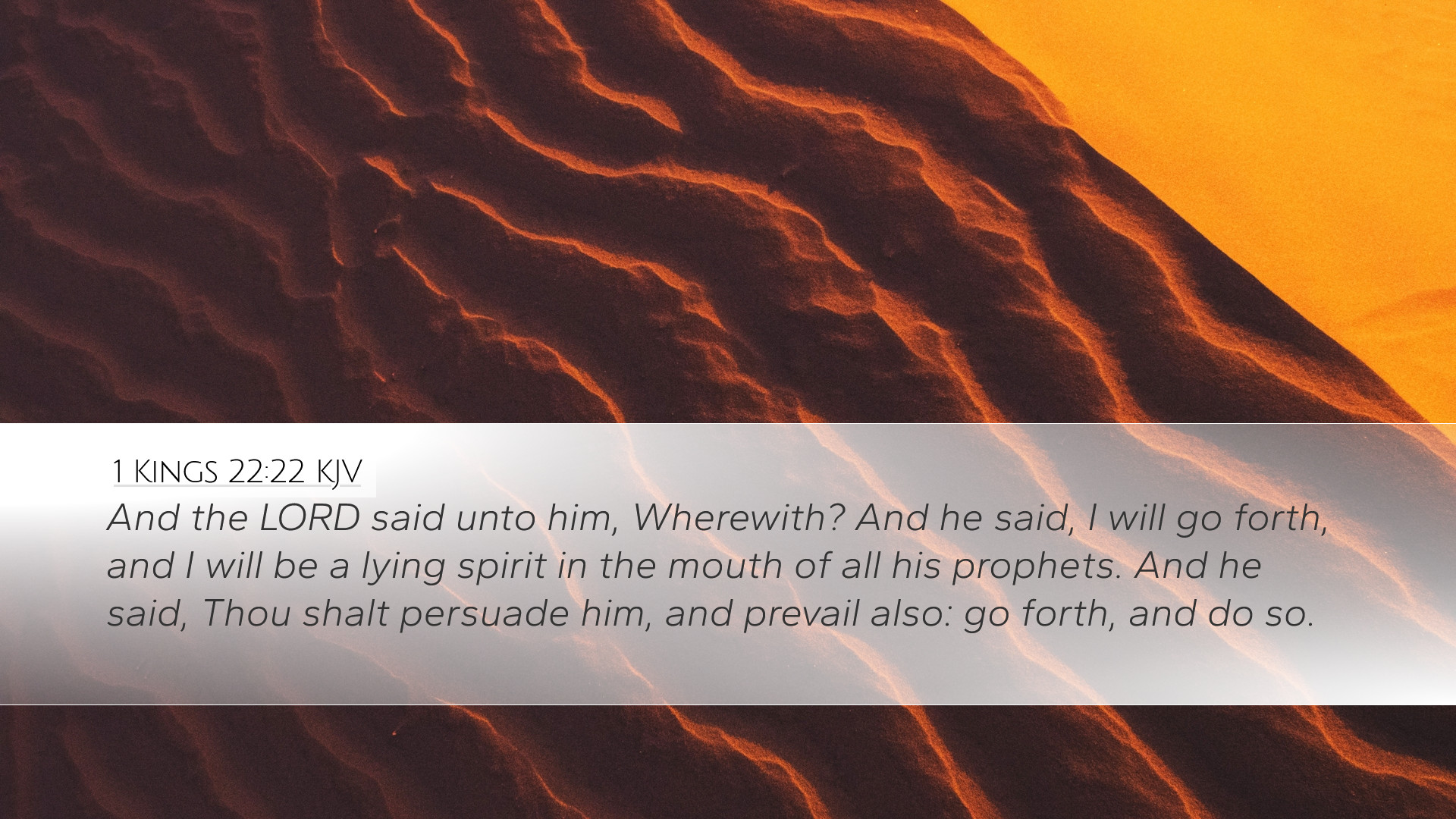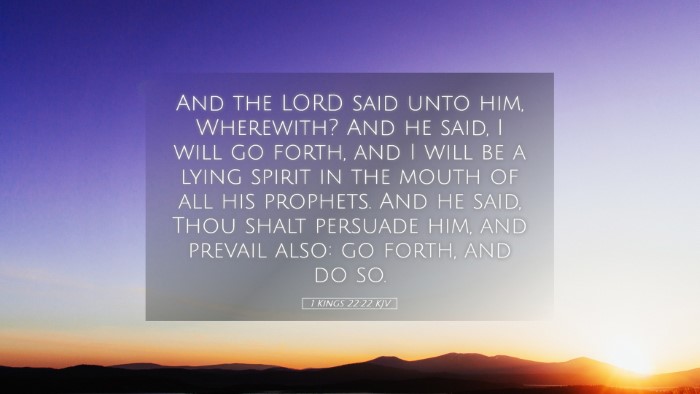Commentary on 1 Kings 22:22
Verse Text: "And the Lord said unto him, Wherewith? And he said, I will go forth, and I will be a lying spirit in the mouth of all his prophets. And he said, Thou shalt entice him, and thou shalt also prevail: go forth, and do so."
Contextual Overview
This passage is set within the broader narrative of the conflict between King Ahab of Israel and the prophet Micaiah regarding the confrontation with Ramoth-gilead. The inquiry into God’s will reveals the tension between divine sovereignty and human agency. Ahab seeks assurance from the prophets, but Micaiah, the true prophet of God, presents a stark contrast to the deceitful assurances provided by Ahab’s prophets. The supernatural elements begin to unveil God’s sovereignty in judgment against Ahab.
Theological Insights
- Divine Sovereignty: This passage illustrates God's control over both the divine and angelic realms. The Lord’s question to the spirit indicates a sovereign plan unfolding, demonstrating that even wicked spirits are under His authority.
- Justice and Deception: The spirit volunteering to be a lying spirit highlights God's justice. Ahab’s previous unfaithfulness evokes a response where God allows deception to fulfill judgment, showing that divine justice may sometimes involve hardening hearts for a prescribed purpose.
- The Role of Prophets: The contrast between true and false prophets is evident. Micaiah's truth represents God's will, in stark contrast to the false assurances given by the multitude of Ahab's prophets who serve their king rather than God.
Commentary from Public Domain Sources
Matthew Henry
Henry emphasizes that in this narrative, "the Lord is in control of every aspect of the spiritual battle." God commissions a spirit to lie to Ahab's prophets, not as an endorsement of deceit but as a means to lead Ahab to his own destruction due to his persistent rebellion against God.
Henry further elaborates that Ahab represents those who prefer smooth and flattering prophecies over the truth, warning of the dangers of surrounding oneself with false prophets. His commentary highlights that God uses the deceptive spirit as a means to accomplish divine judgment, showcasing God's overarching plan for justice.
Albert Barnes
Barnes notes the implications of the phrase "lying spirit" which does not suggest that God directly deceives His people but allows for the deception to unfold as a consequence of their own choices. Ahab’s long-standing unfaithfulness warrants this judgment, and Barnes articulates that these events demonstrate God’s righteous governance over the nations.
He stresses the importance of perceiving the divine orchestration behind the actions of both men and spirits, showing that human decisions are never free from divine oversight. Barnes invites readers to understand the gravity of rejecting God's messengers, as seen in Ahab's rejection of Micaiah's warnings.
Adam Clarke
Clarke underscores the supernatural element in this verse, explaining the hierarchy of spirits. He identifies the lying spirit as one who willingly takes a role to fulfill God's judgment against Ahab. Clarke posits that God's actions, while sometimes perplexing, are always rooted in divine justice and holiness.
Clarke further applies this to contemporary believers by encouraging them to heed the warnings of true prophets and be wary of those who offer comforting lies. He perceptions on the necessity of spiritual discernment remain pivotal, resonating with the continuous challenge facing God’s people to differentiate between truth and falsehood.
Practical Applications
- Discernment: Pastors and leaders are tasked with honing their ability to discern the voice of God amidst prevalent cultural and spiritual distractions, ensuring they guide their congregations towards truth.
- Faithfulness in Leadership: The narrative serves as a stern reminder for leaders to maintain integrity and faithfulness to God’s Word, rather than seeking to appease the desires of followers.
- Understanding Judgment: This passage encourages self-reflection on the potential consequences of persistent disobedience, prompting believers to consider their own walks with God and the seriousness of their spiritual choices.
Conclusion
The account in 1 Kings 22:22 encapsulates profound truths surrounding divine sovereignty, human agency, and the profound dangers of false prophecy. As pastors, students, and theologians reflect upon this scripture, they are reminded of the need for vigilance and fidelity to God's Word in a world filled with enticing yet deceptive messages.


